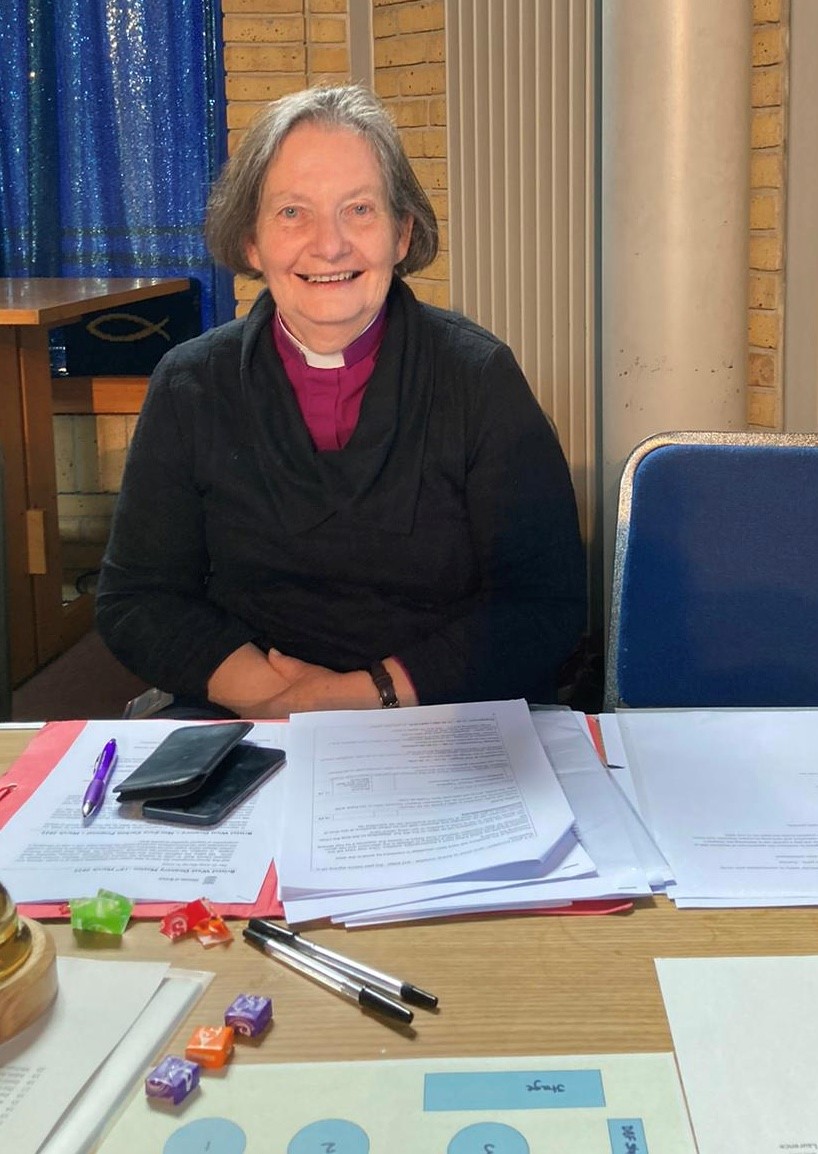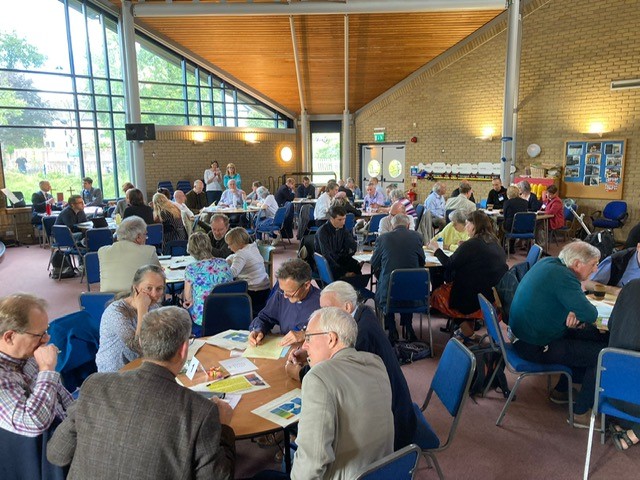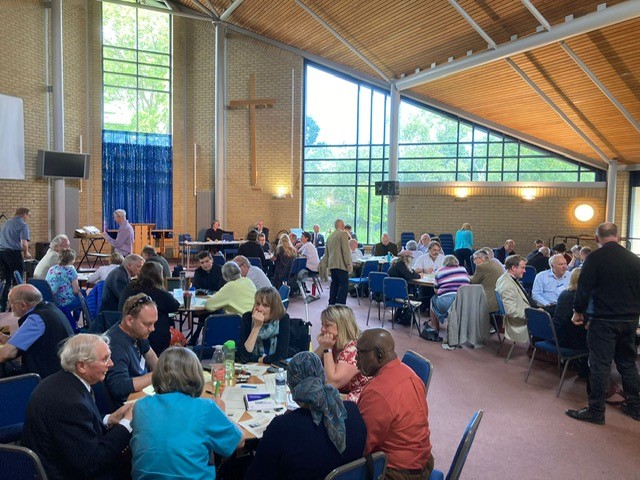Bristol Diocesan Synod Debate and Presidential Address by Rt Revd Vivienne Faull, Bishop of Bristol - Saturday 12 June 2022
 Last year I explored the idea of re-wilding of the church as an idea which might help our thinking about our vision and purpose as a church. Today I want to play a little more with an ecological metaphor.
Last year I explored the idea of re-wilding of the church as an idea which might help our thinking about our vision and purpose as a church. Today I want to play a little more with an ecological metaphor.
In his forest of a novel, The Overstory[1], Richard Powers tells of Patricia Westerford, researching the life and ecology of trees, who, as a post doc starts to examine sugar maples to the east of her university town. Powers writes:
Her breakthrough comes as breakthroughs often do by long and prepared accident. Patricia arrives in her copse on a balmy day in June to find one of her bagged trees under full-scale insect invasion. At first it seems that the last several days of data are ruined. Improvising, she keeps the samples from the damaged tree as well as several nearby maples…Over the next few weeks she finds something that even she isn’t ready to believe. Another nearby tree gets infested. She measures again. Again, she doubts the evidence.
Confirmation comes the following spring. Three more trials and she’s convinced. The trees under attack pump out insecticides to save their lives. That much is uncontroversial. But something else in the data makes her flesh pucker: trees a little way off, untouched by the invading swarms, ramp up their own defences, when their neighbor is attacked. Something alerts them. They get wind of the disaster, and they prepare. She controls for everything, and the results are always the same. Only one conclusion makes any sense. The wounded trees send out alarms that other trees smell. They are linked in an airborne network, sharing an immune system across an acre of woodland. These brainless, stationary trunks are protecting each other. Life is talking to itself, and she, Patricia, has listened in.
Her scientific conclusion from that listening: the biochemical behaviour of individual trees may make sense only when we see them as members of a community.
Richard Powers is fictionalizing the work of Suzanne Simard in Canada in 1997 on how carbon passes between plants in a natural setting[2]. The result was a paper published in the journal Nature, and with it a commentary by Sir David Read, a leading scientist in the field of fungal connections between plants. The journal, after a conversation with David, printed in large letters on the cover a newly coined phrase the Wood Wide Web. Unsurprisingly, the phrase has been gained traction, as good similes do, I heard Monty Don use it in his commentary on the Chelsea show gardens last month marveling, as Pat Westerford did, at this revelation of a new world beneath our feet.
Except that the phrase Wood Wide Web simplifies, even distorts what is really going on. Because the web which links the trees is not a web of tree roots, but an extraordinary, wondrous mass of fungi, a mycorrhizal network. So, when we observe that trees appear to be giving resources to other trees, it is more likely that a fungus notices that tree A is a bit ill at the moment, and tree B isn’t, so it shifts some resources over to tree A.
Here is a vivid botanical example of a complex adaptive network which might be a helpful metaphor for that Saturday between the Festivals of Pentecost and the Trinity.
To pick up a couple of details from this metaphor of complex relatedness as possible applications.
Firstly, as a reminder of our interdependency.
When I put an incumbent into a parish, at the heart of the liturgy receive this cure of souls, which is both yours and mine …here is the expression, in words and ceremonial, of the mutuality of our roles as I share with a parish priest a part, a section, of the cure of the more that 1m souls the Archbishop of Canterbury has shared with me.
Secondly as a reminder of the vulnerability of that interdependency.
We have seen in the Report and Accounts the centrality of parish share to our common life. And that share is vulnerable to those PCCs which decide to hold all that they have to themselves. That leaves parishes with fewer financial assets facing closure in a Darwinian survival of the affluent I am so very grateful for the continued willingness of PCCs to contribute to the life of their sisters and brothers across the diocese and to do so sacrificially for the good of the whole.
There is now, and for us, another Mendelian threat which comes with the possibility of new funding. The addition of large amounts of external resource can also upset the delicate ecology of relationships (imagine the impact of a lottery win on a family). We heard some of the felt impact of new project funding in Canon Gwyn Owen’s intervention at the last synod, an intervention which then bruised those who had worked so hard to bring St Nics and Pattern to birth. Our diocesan ecology is fragile and the bonds of peace and of our common life are easily broken.
So, what concerns me now is that when we (whether in PCCs, or the Diocesan Support Services or the Bishop’s Office) continue to make our plans and agree our goals and targets for the next stage of our life together. As we continue to work with the National Strategic Investment Board, as Richard Leaman and I present to the that Board at the end of June, we remember that this must be both a gift for the whole diocese, and a gift from God to be used in the power of the Holy Spirit. It would be easy to grow the relationships between the various trees of our ecclesiastical life, our parishes, Deaneries, Diocesan Support Services, reaching out in mutual support, and as we do so forget the equivalent of those fungi, those mycorrhizal networks, in the person and power of the Holy Spirit, the Go Between God who moves between us , who nurtures, sustains and sometimes restrains us, and brings life to us all within the complex adaptive system which is the Church of Christ Jesus.
And it is the Holy Spirit, with the Father and the Son, it is the dynamic interdependent life within the Holy Trinity which can then be missional, pressing heavily on those structures in society that prevent people growing into that great circle of God’s self-giving love. This trinitarian life delights in itself and in what is not itself, and then gives itself into the hands of that other to be loved or denied, to be cherished or killed. That love which does bring life in all its abundance, and will, I pray, be our vision and our joy in the years ahead.
+Viv, Trinity Eve
[1] The Overstory A Novel Richard Powers 2018 WW Norton
[2] For more on this see Entangled Life How Fungi make our worlds, change our minds and share our futures Merlin Sheldrake 2020 Penguin Random House (especially chapter 6)

